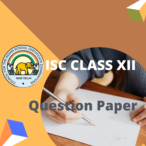HISTORY
![]() Q.1 (i) Which political party formed ministries in a majority of the provinces after the elections of 1937?
Q.1 (i) Which political party formed ministries in a majority of the provinces after the elections of 1937?
(ii) What was the significance of the Lahore Session of the Muslim League (1940)?
(iii) Who was elected President of the All India Congress at the Haripura Session in 1938?
(iv) Name any two princely states that had not signed the Instrument of Accession Accord by 15th August 1947.
(v) Which historical event posed the most serious threat to Indian democracy in 1975-76?
(vi) What is the significance of December 1963 in the history of Nagaland’s demand for autonomy?
(vii) What was the most significant contribution of the Janata Party (1977 – 1979) to the changing face of Indian democracy?
(viii) Name the signatories of the Tashkent Declaration of 1966.
(ix) Which international movement was based on the principles of Panch Sheel?
(x) Mention any one social evil against which a campaign was launched by the Mahila Dakshita Party.
(xi) Which event transformed World War II into a global conflict?
(xii) Mention one tactical mistake made by Hitler during World War II.
(xiii) State one important objective of the Hundred Flowers Campaign.
(xiv) Name the first Prime Minister of independent Kenya.
(xv) Why was the Berlin wall erected?
(xvi) What is meant by the term détente?
(xvii) Name the policies introduced in the USSR by Gorbachev.
(xviii) Why is the Civil Rights Act of 1964 considered a landmark in US legislation?
(xix) Name the book written by Betty Friedan that sparked off the second wave of American Feminism in the 20th century.
(xx) Explain the meaning of the term Intifada.
PART II
Answer five questions in all, choosing two questions from Section A, two questions from Section B and one question from either Section A or Section B.
SECTION A
![]() Q.2 (a) Give an account of the revival of the INA and its contribution to India’s struggle for freedom under the leadership of Subhash Chandra Bose.
Q.2 (a) Give an account of the revival of the INA and its contribution to India’s struggle for freedom under the leadership of Subhash Chandra Bose.
(b) State the main provisions of the Indian Independence Act.
![]() Q.3 Discuss the linguistic reorganisation of states with reference to:
Q.3 Discuss the linguistic reorganisation of states with reference to:
(a) Andhra
(b) Bombay
![]() Q.4 With reference to India’s foreign policy, discuss the following:
Q.4 With reference to India’s foreign policy, discuss the following:
(a) The Kashmir problem and the outbreak of the Indo-Pak war of 1948-49.
(b) The consequences of the Indo-Pak war of 1971.
![]() Q.5 Review the achievements and failures of the Janata Government (1977 – 1979).
Q.5 Review the achievements and failures of the Janata Government (1977 – 1979).
![]() Q.6 (a) What were the main features of the Towards Equality Report (1974)?
Q.6 (a) What were the main features of the Towards Equality Report (1974)?
(b) Briefly discuss the efforts made by various Women’s Movements in India to root out the social evils of dowry and domestic violence.
SECTION B
![]() Q.7 (a) Discuss the significant changes in Mussolini’s foreign policy after 1935, till the outbreak of World War II.
Q.7 (a) Discuss the significant changes in Mussolini’s foreign policy after 1935, till the outbreak of World War II.
(b) Why did Britain and France follow a policy of appeasement towards Germany and Italy?
![]() Q.8 In the context of the civil war and the establishment of the People’s Republic in China, answer the following questions:
Q.8 In the context of the civil war and the establishment of the People’s Republic in China, answer the following questions:
(a) State the causes of the victory of the Communists in the civil war in China in 1949.
(b) What important economic changes were introduced by Mao Tse Tung under the Great Leap Forward?
![]() Q.9 The Cuban missile crisis led to an escalation of international tensions and pushed the world to brink of a nuclear war. Discuss.
Q.9 The Cuban missile crisis led to an escalation of international tensions and pushed the world to brink of a nuclear war. Discuss.
![]() Q.10 In the context of protest movements in the USA, discuss the following:
Q.10 In the context of protest movements in the USA, discuss the following:
(a) The significant change in the attitude of the government towards racial discrimination in the USA.
(b) The impact of the Presidential Commission on the Feminist Movement in the USA (1960s – 1980s).
![]() Q.11 (a) To what extent was Nasser responsible for the Suez War of 1956?
Q.11 (a) To what extent was Nasser responsible for the Suez War of 1956?
(b) State the consequences of the Suez War of 1956.


